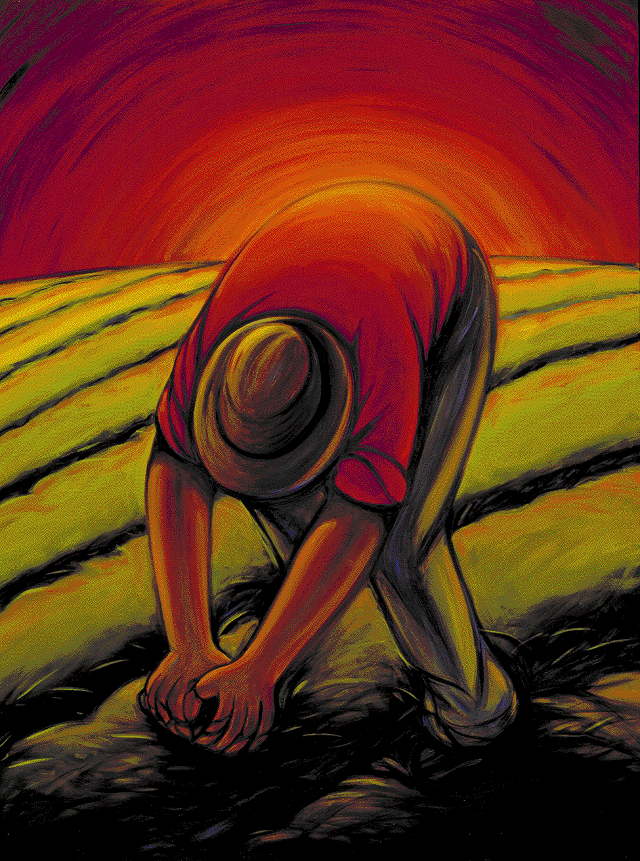- “Campesino”, by Simón Silva (1998)
To many people, the fields of soybeans, oil palms, and sugar cane stretching across the landscape in areas of Latin and South America look like several things. Progress is one. Food is another.
To Eric Holt-Giménez, executive director of Food First/Institute for Food and Development Policy, these fields look nothing like food or progress, particularly for the region’s peasant farmers. “We’re not producing food anymore,” he says. “The leveling of forests, growing oil palm for agrofuels, the huge expansion of what they call the Republic of Soy in Argentina, Paraguay, Uruguay, and Brazil—this is not for food to feed people. This is for feed for animals and agrofuel for cars.”
According to a June 2013 study by the UN Committee on World Food Security, worldwide production of agrofuels, such as corn- and sugar cane-based ethanol and soy-based biodiesel, has increased fivefold in one decade, rising from less than 5.28 billion gallons per year in 2001 to more than 26.4 billion gallons per year in 2011. Meanwhile, about half of the world’s total crops are used for animal feed.
As crop production shifts to feed gas tanks and livestock, not people, peasant farmers are being pushed from the countryside in many developing nations, not just those in Latin and South America. The Global South is becoming less able to feed itself and more reliant on foreign grain imports, processed foods, and industrially-produced meat.
Holt-Giménez calls for a revitalization of the world’s small ecological farms and the surrounding rural communities to help the region combat the spread of industrial agriculture. “It’s much more desirable to develop the small farm sector, which produces real food… like rice, corn, beans, vegetables, grass-fed, homegrown meat, which is much more well-rounded for diets, produces much more resilient local economies,” he says. “And it actually captures carbon rather than releasing carbon into the atmosphere.”
On the importance of reviving rural communities, he doesn’t mince words: “I don’t think we’ve got a future without a healthy peasantry. But that means we have to invest in the countryside and not invest in the ways that we’re investing now… but in fact invest to make the countryside a decent place to live. Roads, schools, water systems. Invest in the small farm sector.”
Holt-Giménez has focused his work on sustainable agriculture, food politics, and peasant-led farmer movements since he arrived in the small, impoverished community of Vicente Guerrero in the Mexican state of Tlaxcala in 1977. As a volunteer, he worked alongside the community’s peasant farmers and villagers to improve rural life through projects like a school garden and a health clinic. He also helped the farmers grow crops more sustainably through soil and water conservation projects. With his help, the farmers created Campesino a Campesino (Farmer to Farmer), a sustainable agriculture movement that has spread across Latin America and helps its members implement ecologically-sound farming practices, raise yields naturally, and improve their local communities. “The farmers have known about [the encroachment of industrial agriculture] for twenty years and have been trying to defend themselves,” he says.
Though Holt-Giménez advocates for agriculture policy changes both in the United States, whose commodity crop market greatly impacts world markets, and in developing countries, he favors another path to change that is often ignored: the collective protests of small farmers. Peasant-led social movements like Campesino a Campesino and the Food Sovereignty Movement that start at the grassroots level and expand to the nationwide, region-wide, and worldwide levels, he argues, are the key to breaking industrial agriculture’s grip on the peasantry. “We need reforms, we desperately need reforms. But they’re not going to come from the reformists,” he says. “The reformists are weak. We need strong social movements to force the reformists to introduce reforms.”
Holt-Giménez spent more than two decades in Latin America before earning his Ph.D in environmental studies in 2002. Today he leads the efforts of Food First, a think tank devoted to ending the injustices that cause hunger. The struggle isn’t just about food production, he’s convinced—it’s about people. Tragically, it’s the human impact of industrial agriculture and agrofuels that tends to go unnoticed. “These are life and death struggles,” he emphasizes. “Livelihoods are being lost as we speak. People have nowhere to go.”


